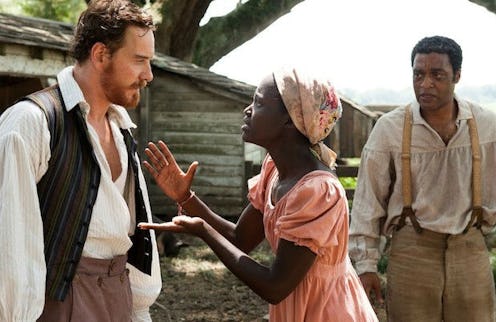
Wonderful news came out of the 2014 Golden Globe nominations. Seven nominations went to black actors, including Chiwetel Ejiofor and Lupita Nyong’o (above) for 12 Years a Slave, Idris Elba for Mandela: Long Walk to Freedom, Kerry Washington for Scandal, and Barkhad Abdi for Captain Phillips, and one nomination went to 12 Years a Slave director Steve McQueen, making him the second ever black director nominated for a Globe.
The news is certainly worth celebrating since for the first time in many years, multiple categories across the board are celebrating a diverse grouping of actors. It's especially great news for Nyong'o, whose nomination is one of 31 total Globe nominations for black women in film (there have been 50 total for male actors). On the television side of the nominations, black women are working with a similar ratio, with Washington's helping the numbers grow just a bit.
Still, when you compare those nominations with the total, over 500 for each gender in film and television historically, and 70 available nominations in 2014's Globes alone, it seems rather strange that seven nominations (four of which are awarded to Ejiofor and Elba) are heralded as "diverse" when, in fact, the Globe nominations — and the industry as a whole — still lack a great deal of diversity.
Some have lamented the lack of nominations for director Lee Daniels or the actors from his film The Butler, including Oprah Winfrey and Forest Whitaker, as well as the lack of praise for Michael B. Jordan, the fantastic lead in Fruitvale Station. But even if these four garnered the nominations, the awards would still lack a more complete representation of the diverse nation tuning into the yearly champagne-soaked television party. And that's because, while there has been great progress in increasing the diversity of big-name actors in leading roles in film and television, for the most part, the industry is still greatly homogenized.
The majority of nominations are still held by white men and white women, and the director and screenplay categories, historically and presently, are almost entirely filled by white men. It's a stark, disheartening representation of the industry's most prized talents, and unfortunately, it appears that there's still much progress to be made. Part of that includes the fact that praise for diverse award nominations doesn't take into account the fact that there are very few nominees, in the history of the Globes and in 2014, of Asian descent and that the list of Hispanic-American actors and artists is even shorter.
Of course, all of this background is not meant as a means to detract from the clear progress the industry has shown in 2013 towards a landscape of artists that more accurately represents the makeup of the global audience sharing in the success of these films. It's incredible to see this many fantastic actors (and a director) rewarded for their work in an industry that's still lacking a great deal of diversity, but it's foolish to think that the success of Elba, Ejiofor, Washington, Nyong'o, Abda, and McQueen means that the industry has suddenly come around.
What it does mean is that change is possible and that perhaps some day, we can herald a lineup of Golden Globes, Emmys, Oscars, or another prestigious industry award nominees that truly fulfill the meaning of the word "diverse."
Image: Fox Searchlight